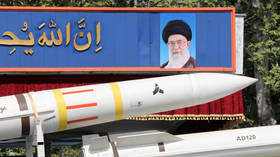SIRIUS business: Simulated Moon mission crew shares its experience after 17-day ‘trip'
A 17-day SIRIUS mission has concluded in Moscow with the crew of six successfully leaving isolation, following a simulated space flight to the Moon’s orbit and back.
The SIRIUS project (Scientific International Research in Unique Terrestrial Station) was “launched” on November 7 at the Institute of Biomedical Problems of the Russian Academy of Sciences (IBMP RAS) in cooperation with NASA.The experiment’s goal was to simulate the conditions of a long-term space flight, specifically the voyage to a prospective Moon orbital station, dubbed 'Deep Space Gateway.' The station, which is still at an early concept stage, is expected to be constructed in the 2020s in a possible partnership between Roscosmos and NASA.
READ MORE: Lunar robots deployed to Mount Etna to prepare for future landings on Mars, moon
The SIRIUS -17 mission saw three men and three women performing a simulated flight to the Moon in a IBMP RAS complex, which was previously used in the 'Mars 500' project. Mars 500 was a series of successful experiments performed between 2007 and 2011, which included 14- and 105-day isolations, as well as a 520-day simulated flight and landing on the Red Planet.
The hatch opened and the SIRIUS crew left the module Friday, following 17 days of isolation. “The SIRIUS mission has completed its task in full,” said Mark Serov, the mission’s captain. “The team is OK. All the systems aboard worked perfectly. We’re feeling well. Our mood is great.”
Despite the cramped environment, the crew did not experience any psychological problems, the captain added. The schedule of the mission was so busy that the team only had time to focus on working.
The hardest day of the mission was the first one when the crew members were still settling inside their not-that-spacious quarters. “And the next rather difficult moment was the sleep deprivation when we had to work without a break [for 38 hours]. It was, at the same time, the most interesting part of our work as we received maximum satisfaction when we coped with it and did it at a good level,” Serov said.
During the sleep deprivation, all of the crew members also performed a manual VR-simulated docking of the planned future Russian Federatsiya (Federation) spaceship with a booster rocket in the Earth’s orbit, and everybody passed the test successfully. “It proves that we’re making the right technical decisions” regarding the Federatsiya’s steering system “that even non-professional pilots can cope with the task,” said Serov, a former test cosmonaut and an employee of RKK Energia, which is developing the spacecraft.
The SIRIUS team also trained remotely piloting moonwalkers on the moon surface, using virtual reality glasses. VR has also proved to be an effective tool for psychological support in an isolated environment. “We had goosebumps. It helped us so much. Being in a confined space, we were able to travel to different parts of the world. It was great,” Serov said.
During the whole 17 days, the IBMP scientists closely monitored the vital signs of the crew, including microbiological indicators, motor and noise activity as well as their psychological condition. The participants of the mission also tested the spacesuits that are to be used by cosmonauts during the Moon voyage. The crew also extensively addressed the issue of hygiene during space fight, saying that the wet towel wipes, the same as used at the International Space Station (ISS), satisfied all their needs.
The female crew members told journalists about a space shampoo that can be used without water. They said that the three women required three tubes of the substance to keep their hair clean for two weeks.
With the active phase of the experiment concluded, the crew will be undergoing background examinations of physical and psychological indicators until December 5, and the results will be compared to those of a survey performed before the 17-day isolation began. The SIRIUS project will continue in 2018 with a four-month simulated flight.












